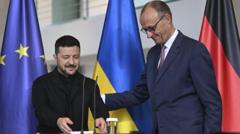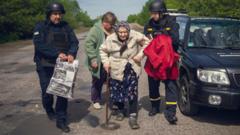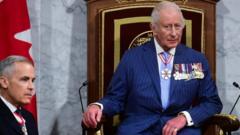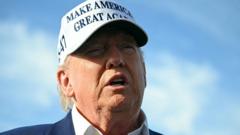Amidst the pressures from both Russia and the United States, Germany is navigating a new chapter in NATO's defense strategy, striving for a more proactive role while maintaining diplomatic ties.
**Germany Strives for NATO Leadership Amidst Russia's Military Posturing**

**Germany Strives for NATO Leadership Amidst Russia's Military Posturing**
Germany's Chancellor Friedrich Merz emphasizes the nation's commitment to NATO amidst increasing tensions with Russia.
Chancellor Friedrich Merz of Germany is currently facing a significant challenge as he takes office. His leadership comes at a time when Russia's assertiveness on its eastern border and pressures from the U.S. to increase European allies' defense contributions are intensifying. In a bid to establish Germany as a key player within NATO without igniting further aggression from Russia, Merz is focusing on reforming the nation’s military stance.
Recently, Merz visited Vilnius, Lithuania, to oversee the activation of a new German tank brigade, a move intended to fortify NATO's eastern defenses against potential Russian advances, particularly through Belarus. This development marks a historic shift for Germany, being the first instance of a fully armored brigade permanently stationed outside the country since World War II—a significant statement given the historical context of Nazi occupation.
The activation ceremony attracted hundreds of Lithuanians who filled Vilnius’s iconic cathedral square, celebrating a transformation in their defense landscape. Merz addressed the cohort of around 700 German soldiers, highlighting a renewed sense of duty and commitment to collective defense. "Throughout the years of the Cold War, Germany could rely on our allies standing by our side at any emergency — today, we are here, the ones who have a duty,” he remarked, signaling a shift in Germany's military posture.
As Germany navigates these complex geopolitical waters, Merz's leadership will be critical in defining the future dynamics of NATO and its strategic objectives on the eastern front.
Recently, Merz visited Vilnius, Lithuania, to oversee the activation of a new German tank brigade, a move intended to fortify NATO's eastern defenses against potential Russian advances, particularly through Belarus. This development marks a historic shift for Germany, being the first instance of a fully armored brigade permanently stationed outside the country since World War II—a significant statement given the historical context of Nazi occupation.
The activation ceremony attracted hundreds of Lithuanians who filled Vilnius’s iconic cathedral square, celebrating a transformation in their defense landscape. Merz addressed the cohort of around 700 German soldiers, highlighting a renewed sense of duty and commitment to collective defense. "Throughout the years of the Cold War, Germany could rely on our allies standing by our side at any emergency — today, we are here, the ones who have a duty,” he remarked, signaling a shift in Germany's military posture.
As Germany navigates these complex geopolitical waters, Merz's leadership will be critical in defining the future dynamics of NATO and its strategic objectives on the eastern front.




















